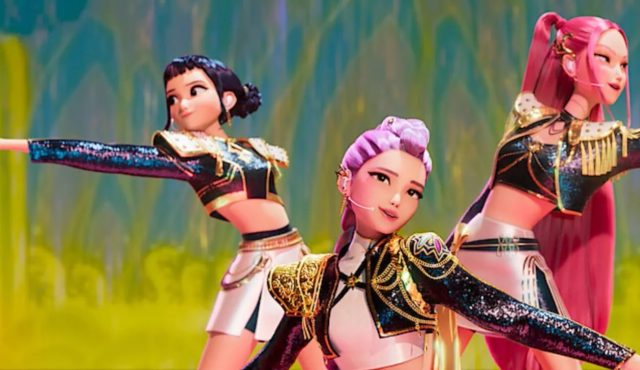
I am a big K-drama fan. At least I think so, considering in the two years since I started following Korean pop culture, I can differentiate a Park Shin-hye from Bae Suzy and a Hwang Min-hyun from Cha Eun-woo. I am fluent in Annyeonghaseyo, Gwenchanayo, and Gamsahamnida (hello, it’s okay, and thank you, respectively, in Korean). My K-drama watchlists go beyond the big three (Netflix, Prime, and Hotstar); I am guilty of having a subscription to Viki Rakuten (an Asian streamer), and the only notifications I say ‘yes’ to are new K-drama releases.
Fair disclosure: K-Pop Demon Hunters — the animated fantasy action musical, which has become Netflix’s most-watched movie ever with all-time views of 325.1 million — wasn’t on my radar. There were two reasons I decided to give it a whirl: one, because Ahn Hyo-seop, of Business Proposal and Dr Romantic Fame, voiced the male lead Jinu; and two, to see what all the fuss was about. Happy to report curiosity did not kill the cat.
K-pop girl band Huntr/X members, Rumi, Mira, and Zoey, must use the strength of their music to power and turn the Honmoon — an invisible shield that protects the human world from Gwi-ma, the ruler of demons who feasts on people’s souls — golden and lock its security once and for all. On the face of it, the storyline of K-Pop Demon Hunters is as basic as it gets. It is a good-versus-evil tale. But makers Maggie Kang and Chris Appelhans have layered it in a way that makes the narrative simple enough for young ones but lends it enough depth to make it worth the seasoned fans’ time.
We have all heard of “an eye for an eye” and that one must “fight fire with fire”. In K-Pop Demon Hunters, it’s music against music. Gwi-ma’s failed attempts over centuries to take over the human world lead Jinu, a young, easy-on-the-eyes demon with a velvety voice, to devise a plan to steal Huntr/X’s fan base with a boy band: Saja Boys. Their debut release “Soda Pop” is an instant hit and their inroad into controlling the human world.
“What is new about the plot?” one may argue. But the fact of the matter is, “What is there not to like about this plot?” There is manipulation. There is betrayal. There is resistance. There is also a flicker of romance, unwavering friendship, hope and, above all, a happy ending, with the triumph of good over evil — all things quintessential to good K-dramas. K-Pop Demon Hunters shines in its execution. The engaging storytelling, complemented by catchy, well-timed, theme-appropriate music, makes the production equal parts ambitious and entertaining. You can’t complain about a template if the template works.
That K-Pop Demon Hunters has one foot in the past and the other in the present of Korean traditions also works in its favour. There are, of course, references to familiar Korean elements like the food — from kimchi and hotteok to naengmyeon, Pepero sticks, and Korean corn dogs — and bathhouses, but there are also characters from Korean folklore that notch up the intrigue with an element of fantasy.
For instance, Derpy Tiger, Jinu’s larger-than-life blue cat with a snaggletooth that is tasked with delivering messages to Rumi secretly, is based on the image of a feline in the Minhwa style of painting that flourished during the Joseon dynasty. Like in the traditional art form, in the film too, the cat is seen with a magpie.
The character of Gwi-ma — inspired by the Korean folklore of evil spirits or gwishin — embodies the devil and is innovatively woven in to deliver a message of contemporary resonance. Jinu made a deal with him to escape a life of poverty, regretfully leaving behind his family. Rumi, born to a hunter mother and demon father, has been struggling with her secret dual identity her entire life. Both must overcome the metaphorical and literal demons within to find their true selves.
At the risk of oversimplifying, K-Pop Demon Hunters is akin to a visual fable, but it is the connection it establishes with audiences — pushing them down an endless rabbit hole of K-culture — across age and geography that makes it a masterclass in onscreen production.
Now we know what the Huntr/X girls meant when they sang, “I’m gonna show you how it’s done, done, done!”
trisha.mukherjee@expressindia.com